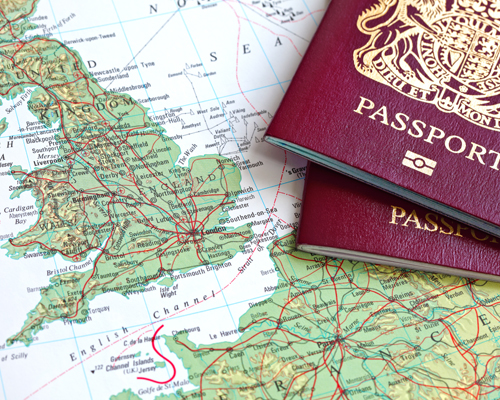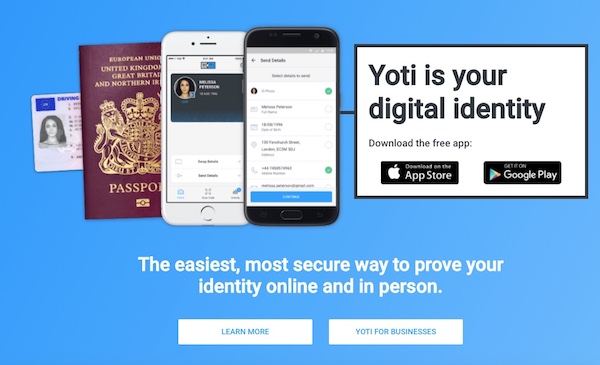

A frontrunner is emerging in the government’s bid to get Jersey citizens using a fully digital ID system – a mobile app that ditches passwords for facial recognition.
Smartphone app Yoti is expected to be the States’ chosen platform for allowing islanders to prove who they are when accessing government services.
The free app aims to replace the need to carry around multiple ID documents by storing all user information securely, protected by both facial recognition and a pin code.
The London-based app ID service is currently valued around £65million and has worked alongside partners including NHS Ipswich Hospital, NSPCC and the Universities of Bristol and Greenwich. More recently they’ve piloted alcohol age-check software at UK supermarket checkouts and worked with pub and club chain, the Deltic Group.
Video: How Yoti uses facial recognition as a password. (Yoti)
In a Jersey context, Yoti could pave the way for ePetitions and electronic voting, as well as a way for islanders to securely access the data the government holds about them – whether health or social security-related
The Digital Delivery team in charge of finding an electronic ID solution for the island have remained tight-lipped during the procurement process on how many providers have tendered and who they are for “commercial sensitivity” reasons.
However, the most recent blog in a series entitled ‘Towards a digital ID’ revealed some of their expectations for Digital ID – that it would be a free and non-compulsory smartphone-based solution used by 20% of islanders over 16 in its first year and 40% by the end of 2019.
While the States website says that the project is due to go ‘live’ in March, it is unknown whether this will still be the case. Due diligence was originally scheduled to be complete in November and contracts signed in December; but the team behind the project said that discussions were still ongoing with the preferred supplier and did not provide an expected date of completion.
The Digital ID project forms part of the eGov initiative to get more services online. It has previously come under fire for missing deadlines and for having nearly exhausted its budget of just under £10million without having secured a Digital ID solution. That will cost extra.

Pictured: The States hope that the development of a Digital ID will stop islanders from having to carry around multiple documents such as passports to access government services.
The government started its journey towards securing one for the island in earnest in 2015 – a move was largely inspired by a 2014 trip to Estonia, where 98% of citizens carry an electronic ID card that can be used in travel, securing prescriptions, checking medical records or even voting online.
In a bid to learn more about how to adapt this model for Jersey, the government’s ‘Digital Delivery’ team joined OIX (the Open Identity Exchange) – an identity software-focused group they hoped would help them link up with potential providers of a future Digital ID. Yoti is amongst its membership.
While enthusiasm for an e-government was initially stimulated by Estonia, the solution sought by the States of Jersey was different. When the official tender process opened in August last year, the criteria made it clear the ID product must involve an app accessible on Apple and Android platforms.
“The Digital Identity Service shall provide identification methods that enable identification to be performed entirely digitally. These methods shall include performing identification performed entirely through a mobile device,” the criteria read.
Though the tender process started in summer, Express research revealed that the Digital Delivery team had demonstrated interest in Yoti for a far longer period.

Pictured: Yoti's website.
As early as January last year, the States Digital team was working on integrating Yoti with government systems using online software development website GitHub – a platform also used to develop ePetitions and the Bus Tracker on the LoveJersey app. Head of Digital Delivery Marcus Ferbrache and Tech Consultant Robbie Andrews were the only two names listed as being involved in digital projects on the States' Github webpage, but it does not state who was specifically involved in the Yoti project.
In November 2017, a ‘States of Jersey citizen portal’ appeared on the Yoti website. It has since been taken down, but archived versions of the site show that it requested the user’s name, mobile number, email address, date of birth, address, gender and nationality. The portal area also included a link to contact Mr Ferbrache via email, as well as a link to the government’s Privacy Policy page on their website.
This interest appeared to continue as Mr Ferbrache, who also follows the app’s progress on Twitter, posted on a Yoti forum asking about supported mobile models as recently as December.
Both Yoti and the States of Jersey declined to reveal whether they were working together when contacted by Express.

Pictured: The customer portal as it appeared on the Yoti website (left), Yoti appears on the States' GitHub software development site (right, above and below).
A spokesperson for the States of Jersey commented: “The procurement process has been progressing well. The invitation to tender went out in August last year, we have narrowed down the field since then, and for the last couple of months have been focussing on a particular solution.
“However, the procurement process is not complete and the next few weeks are crucial as officials continue to discuss technical, commercial and contractual matters with the preferred supplier.
“We will not be making any announcements until this important process is complete.”
Comments
Comments on this story express the views of the commentator only, not Bailiwick Publishing. We are unable to guarantee the accuracy of any of those comments.